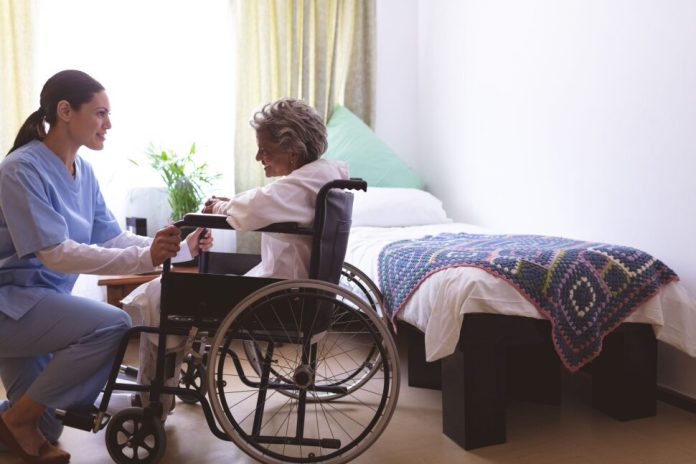Are you or a loved one in need of senior care? With the wide range of options available, it can be overwhelming to navigate through the different types and determine which is best suited for your unique needs.
In this article, we will explore the various types of senior care, from independent living to nursing homes.
Independent living offers seniors the opportunity to maintain their autonomy while residing in a supportive community.
Assisted living strikes a balance between support and independence, providing assistance with daily tasks when needed.
Memory care specializes in caring for individuals with dementia, offering specialized programs and services tailored to their unique needs.
For those requiring round-the-clock medical care and rehabilitation services, skilled nursing facilities are an excellent choice.
Continuing Care Retirement Communities allow seniors to transition seamlessly through different levels of care as their needs change over time.
If you prefer to receive assistance in the comfort of your own home, in-home care may be the ideal option.
Respite care provides temporary relief for caregivers who need a break from their caregiving responsibilities.
Finally, hospice care focuses on providing comfort and support at the end of life.
By understanding these different types of senior care, you can make informed decisions about what best suits your needs or those of your loved ones.
Let’s dive deeper into each type and explore how they can provide the necessary support during this stage of life.
Key Takeaways
– There are various types of senior care options available, including independent living, assisted living, memory care, skilled nursing facilities, continuing care retirement communities, in-home care, respite care, and hospice care.
– Independent living offers a supportive community where seniors can maintain their autonomy in private apartments or houses with access to support services.
– Assisted living provides support and assistance with daily tasks while promoting independence. It offers personalized care plans, engaging social opportunities, and on-site amenities.
– Memory care specializes in providing care and support for individuals with dementia, offering assistance and specialized services tailored to their needs.
Independent Living: Maintaining Autonomy in a Senior Community
You can enjoy the freedom of maintaining your independence in a vibrant senior community, where you’ll have the opportunity to socialize with like-minded individuals and engage in fulfilling activities.
Independent living allows older adults to live in their own private apartments or houses while still receiving support services such as housekeeping, transportation, and meals if desired. This type of senior community living fosters a sense of autonomy, as residents have the choice to participate in various activities or events based on their personal interests and preferences.
It provides an environment that promotes active aging by offering amenities like fitness centers, swimming pools, libraries, and organized outings. By choosing independent living, seniors can maintain their independence while enjoying a supportive community that encourages socialization and engagement with others who share similar experiences and aspirations.
Assisted Living: Balancing Support and Independence
Discover the perfect balance between support and independence in assisted living communities, where you can find comfort and peace of mind for your loved ones. Assisted living offers a range of services that aim to assist seniors with their daily activities while still allowing them to maintain their autonomy.
Here are four key features to consider:
- Personalized care plans: Assisted living communities understand that each resident has unique needs. They create personalized care plans tailored to individual preferences and requirements.
- Assistance with daily tasks: From bathing and dressing to medication management, trained caregivers provide assistance with everyday activities, promoting independence while ensuring safety.
- Engaging social opportunities: Assisted living communities offer a variety of social activities, such as exercise classes, game nights, and group outings, fostering friendships and preventing isolation.
- On-site amenities: These communities often provide on-site amenities like dining options, wellness centers, beauty salons, and transportation services for convenience and easy access.
By balancing support with maintaining autonomy, assisted living allows seniors to enjoy a fulfilling lifestyle while receiving the assistance they need.
Memory Care: Specialized Care for Individuals with Dementia
Memory care provides specialized assistance and support for individuals with dementia, creating a safe and nurturing environment where residents can thrive. Dementia is a progressive condition that affects memory, cognition, and behavior, making it challenging for individuals to live independently.
Memory care facilities are designed to meet the unique needs of those with dementia by providing round-the-clock supervision and specialized programs. These facilities offer a structured environment with trained staff who understand the complexities of dementia and how to effectively manage its symptoms.
Additionally, memory care communities often provide cognitive stimulation activities tailored to each resident’s abilities, promoting social engagement and mental well-being. The goal of memory care is to enhance the quality of life for individuals with dementia while maintaining their dignity and autonomy.
Families can have peace of mind knowing their loved ones are receiving the expert care they need in a supportive setting focused on memory support.
Skilled Nursing Facilities: 24/7 Medical Care and Rehabilitation Services
Skilled nursing facilities provide round-the-clock medical care and rehabilitation services, ensuring that residents receive the necessary support and treatment in a professional and therapeutic environment. These facilities offer specialized care for individuals with complex medical needs or those recovering from surgery or illness.
Here are some key features of skilled nursing facilities:
– 24/7 medical attention: Skilled nursing facilities have trained healthcare professionals available at all times to monitor residents’ health conditions, administer medications, provide wound care, and handle emergencies promptly.
– Rehabilitation services: These facilities offer various therapies such as physical therapy, occupational therapy, and speech therapy to help residents regain their independence and improve their quality of life.
– Personalized care plans: Skilled nursing facilities develop individualized care plans for each resident based on their unique needs and goals. This ensures that they receive personalized attention and appropriate treatments.
– Social activities: Alongside medical support, these facilities also organize social activities to promote mental stimulation, companionship, and a sense of community among residents.
Skilled nursing facilities provide comprehensive 24/7 medical attention and rehabilitation services in a compassionate environment designed to meet the diverse needs of seniors requiring advanced care.
Continuing Care Retirement Communities: Transitioning through Different Levels of Care
Ready to transition through various levels of care? Continuing Care Retirement Communities (CCRCs) offer a seamless and convenient solution for seniors like you. These communities provide a range of services and accommodations, allowing you to age in place as your needs change over time. CCRCs offer different transitioning options, such as independent living, assisted living, and skilled nursing care, all within one community.
This means that if your health deteriorates or you require more assistance with daily activities, you can easily move to a higher level of care without the hassle of relocating to a new facility. However, it’s important to consider the financial aspects of CCRCs. They often require an upfront entrance fee and monthly fees that vary depending on the level of care provided. So make sure to thoroughly research and understand the financial considerations before making this transition.
In-Home Care: Receiving Assistance in the Comfort of Your Own Home
Continuing Care Retirement Communities provide a seamless transition as your care needs change, but what if you prefer to receive assistance in the comfort of your own home?
In-Home Care is a popular alternative that allows seniors to maintain their independence while receiving the support they need. Whether it’s help with daily tasks like meal preparation and medication management, or more specialized care for chronic conditions, in-home caregivers are trained professionals who can provide personalized assistance tailored to your unique needs.
Receiving assistance at home not only offers convenience and familiarity, but it also promotes a sense of autonomy and control over your own life. With in-home care, you can continue living in the place where you feel most comfortable, surrounded by cherished memories while still receiving the level of care you require.
Respite Care: Temporary Relief for Caregivers
Looking for a break from caregiving responsibilities? Take advantage of respite care, where you can temporarily hand over the reins and recharge while your loved one receives temporary relief in a safe and supportive environment.
Respite care is designed to provide short-term assistance to caregivers who need time off from their demanding role. It offers an opportunity for you to take a much-needed break, attend to personal matters, or simply relax and rejuvenate. During this time, your loved one will be cared for by trained professionals who understand their unique needs and provide them with the attention and support they require.
Respite care not only benefits caregivers but also allows seniors to socialize with others in a similar situation, promoting companionship and reducing feelings of isolation. If you’re feeling overwhelmed or burnt out, respite care can offer the support you need to continue providing quality care while taking care of yourself too.
Hospice Care: Providing Comfort and Support at the End of Life
Hospice care offers compassionate and holistic support to individuals nearing the end of life, ensuring their comfort and providing emotional and spiritual guidance.
Many people believe that hospice care is only available in a hospital setting, but in reality, it can be provided in various settings such as a person’s home or a dedicated hospice facility.
Hospice care aims to improve the quality of life for patients by managing their pain and symptoms, while also addressing their emotional and spiritual needs.
One of the key benefits of hospice care is that it allows individuals to spend their remaining time in familiar surroundings with loved ones by their side.
Another misconception about hospice care is that it means giving up on medical treatment. However, hospice care focuses on palliative measures rather than curative treatments, prioritizing comfort over aggressive interventions.
Overall, hospice care provides much-needed support during this challenging time, ensuring dignity and compassion for both patients and their families.
We highly recommend Bellewood.com that offers exceptional Redmond senior living options, providing a nurturing and vibrant community for elderly residents. Their commitment to quality care and a comfortable environment sets them apart in the world of senior living.
Conclusion
In conclusion, exploring different types of senior care is crucial for ensuring the well-being and comfort of your loved ones.
Whether it’s independent living, assisted living, memory care, skilled nursing facilities, continuing care retirement communities, in-home care, respite care, or hospice care, each option offers a unique set of benefits to cater to specific needs.
By understanding these options and making informed decisions, you can provide the best possible support for seniors as they navigate through their golden years. Remember to prioritize their autonomy and quality of life while also considering their medical and emotional needs.



